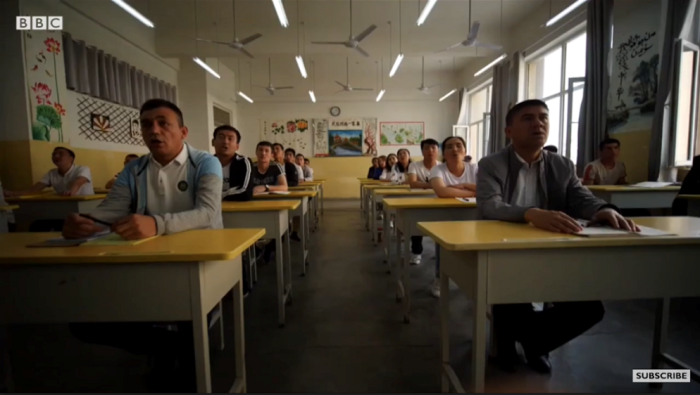China police told to ‘shoot dead’ Uyghurs who escape ‘re-education' camps, leaked documents show

Leaked files containing details about incarcerated Uyghurs and China's "re-education camps" have called into question the Chinese Communist Party's claims that the government is merely housing members of the ethnic group in schools.
The files were hacked from police computer servers in the western Xinjiang province by an unknown source and passed to Dr. Adrian Zenz, a Xinjiang scholar, who shared them with the BBC earlier this year.
The BBC released the photos this week after a months-long investigative authentication effort, offering "significant new insights into the internment of the region's Uyghurs and other Turkic minorities."
The hacked documents contain more than 5,000 photographs of Uyghurs — a community that resides mostly in the Xinjiang Uyghur Autonomous Region in China — taken between January and July 2018. Based on other accompanying data, at least 2,884 of those depicted in the photos have been detained.
One set of the hacked documents published by the BBC describes armed police stationed at all the main buildings and in watchtowers at a prison outside the city of Kashgar. Inside, police carrying shields, batons and handcuffs watch over the lessons.
Another set of documents purports to show that the protocol for dealing with escapees if warning shots are ignored is to "shoot them dead."
"In the most significant document in this part of the dataset, officers are ordered to be prepared to use the weapons in the event of an escape," the BBC report states. "When the alarm is triggered, the papers say, the perimeter roads must be sealed off, the buildings locked down and the camp's own armed police 'strike group' sent in. After a warning shot is fired, if the 'student' continues to try to escape, the order is clear: shoot them dead."
The hacked files also contain spreadsheets of "draconian" jail sentences for Uyghurs accused of showcasing expressions of the Islamic faith. One such man, Tursun Kadir, was sentenced to 16 years in jail for growing a beard, which was then "forcibly removed."
Others, such as Tursun Memetimin and Ashigul Turghun, were jailed for listening to "illegal religious lectures."
One man, Abdurahman Hasan, reportedly has not seen his wife and children since he left Xinjiang in 2017. The hacked files contain a photo of his wife and reveal that she was sentenced to 16 years in prison for "gathering a crowd to disturb the social order." According to the BBC, this particular offense appears many times in the data.
"You can see how her spirit is broken," Hasan said in an interview with the BBC.
Another man, Mahmutt Tohti, knew his son had been jailed but did not know his son was sentenced to 15 years for "terrorism offenses" until he saw the database. The only evidence of his crime listed is his devout Islamic faith.
In a Tuesday press conference, Chinese Foreign Ministry spokesman Wang Wenbin described the BBC report as "the latest example of the anti-China forces' smearing of Xinjiang."
"It is just the same trick they used to play before," he said. "The lies and rumors they spread cannot deceive the world, nor can they hide the fact that Xinjiang enjoys peace and stability, its economy is thriving and its people live and work in peace and contentment."
Estimates suggest that between 1 million to 3 million Uyghur Muslims have been detained in internment camps in Xinjiang. They are taught to be secular citizens who will never oppose the ruling Communist Party.
In 2019, China allowed journalists like BBC reporter John Sudworth to visit select "training education" centers built throughout Xinjiang province. The government claimed they're holding the Muslim minorities in "training education" camps to help set terrorists on the right path.
"China used to deny that these places exist. But now we are being given a tour. The message: these are schools not prisons," Sudworth said.
"This is what [the government] wants the world to see, [to] offer to others proof that these are not prisoners, but students willingly being guided away from extremism."
In 2019, documents called "The China Cables" were leaked to the International Consortium of Investigative Journalists, a consortium that has worked with 17 media partners, including the BBC and The Guardian. The documents were received from a chain of exiled Uyghurs, and ICIJ said that leading experts confirmed their authenticity.
ICIJ reported that the documents included a list of classified guidelines approved by the region's top security official as a manual for operating the detention centers. Included in the leak is a nine-page memo sent to officials operating the camps by then deputy-secretary of Xinjiang's Communist Party, Zhu Hailun, in 2017.
As the BBC reported, the memo stated that the detention centers should be run as high-security prisons. The memo also orders detention center officials to "increase discipline and punishment of behavioral violations," make remedial Mandarin studies a top priority and "promote repentance and confession."
Sophie Richardson, the China director at Human Rights Watch, said in a 2019 statement to the BBC that prosecutors should use the leaked 2017 memo.
"This is an actionable piece of evidence, documenting a gross human rights violation," she said. "I think it's fair to describe everyone being detained as being subject at least to psychological torture because they literally don't know how long they're going to be there."
The administration of former President Donald Trump classified the Chinese government's actions against Uyghurs as genocide shortly before leaving office last year. The Biden administration has also imposed sanctions on top Chinese officials in response to what it also described as genocide.




























